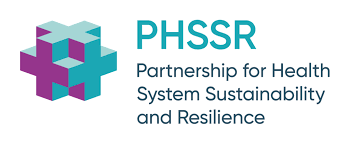تحت رعاية سموّ الشيخ خالد بن محمد بن زايد آل نهيان، ولي عهد أبوظبي رئيس المجلس التنفيذي لإمارة أبوظبي
Under the Patronage of His Highness Sheikh Khaled bin Mohamed bin Zayed Al Nahyan, Crown Prince of Abu Dhabi and Chairman of Abu Dhabi Executive Council
How Healthy is Your Company?

The recent COP event and Arab Health Conference in the UAE along with the ESG Summit in Saudi Arabia, there is a growing spotlight on the necessity of protecting our planet by promoting greater sustainability as a critical response to climate change. I was privileged to talk about this topic on a panel at Arab Health, hosted by Al Tamimi & Co. The health industry is no exception to the climate change debate, contributing to almost double the damage of the aviation industry. More importantly, when there is a climate disaster, human beings turn to health systems for support. Therefore, it is vital that health organisations must address this challenge and the best way to do that is to focus on their own organisational health. Not just in terms of financial stability and operational efficiency, but in how resilient and adaptable they are to environmental challenges.
Understanding the Impact of Climate Change on Organisational Health
Recent alarming statistics, such as those in the Lancet Countdown report, illustrate the severe implications of climate change on health and economics. The report indicates $164 billion costs due to heat-related mortality from 2018-2022 and a staggering $863 billion lost in 2022 due to heat-related labour production losses. The cost of deaths, linked to air pollution has cost the global economy around $2.2 trillion (2020 figures). These figures highlight the urgency for organisations, especially in the healthcare sector, to integrate sustainability and employee well-being into their operational fabric.
Fostering Employee Wellbeing and Sustainable Practices
Healthcare organisations, particularly in the MEA region, can adopt a proactive stance towards sustainability, starting with their workforce. Key steps include:
In-depth Climate and Health Education: Expand the scope of education for healthcare staff to understand the intricate links between climate change and health. In the region, climate change has a direct impact on respiratory, hypertension, and diabetes to name a few. Empower staff to make informed decisions and advocate for sustainable practices in their professional and personal lives. Teach employees about the UN’s Sustainable Development Goals and how healthcare plays a critical factor across multiple domains.
Promoting Sustainable Workplace Practices: Encourage staff to engage in sustainable practices such as reducing waste, conserving energy, and participating in environmental programs. The collective efforts of employees, especially in larger organisations, can lead to significant environmental and financial savings.
Holistic Wellness Programs: Develop comprehensive wellness programs that encompass both personal health and environmental sustainability. Encourage activities like using sustainable transportation methods and participating in community environmental initiatives.
Leadership in Environmental Advocacy: Empower and support medical professionals to be leaders in environmental health advocacy. Their participation in public health campaigns and community outreach programs focused on sustainability and climate change mitigation can have a profound impact.
Deepening the Focus on Employee Wellbeing
To create a sustainable and healthy workplace, focusing on employee well-being is paramount. This includes:
Enhanced Mental Health Support: Strengthen Employee Assistance Programs (EAPs) to offer comprehensive mental health support, recognising the psychological impact of environmental changes and workplace stress.
Innovative Physical Health Initiatives: Develop creative and engaging initiatives that promote physical health, such as company-wide fitness challenges, nutrition workshops, and regular health screenings. Reducing barriers, increasing the enabling variables of behaviour theory and change management, creating a healthier workforce will lead to a happier workforce.
Promoting a Balanced Work-Life Environment: Implement policies that prioritise employee wellness, such as flexible working hours, mental health days, and initiatives that encourage a healthy work-life balance. This has a proven positive impact on staff morale, productivity, and retention.
Encouraging Broader Community and Environmental Engagement: Recent research from Oxford University, UK promotes the initiative of inspiring employees to take part in community and environmental initiatives. The research shows long-term positive employee mental health can be achieved through such programmes. However, this also fosters a sense of purpose and connection to the sustainability mission as well as enhances the organisation’s impact on societal health.
Also Read: Climate Impacts on our Health and Wellbeing
A healthy workforce is a happier workforce. In facing the challenges posed by climate change, healthcare organisations have the opportunity to lead by example in promoting both employee well-being and sustainable practices. At UCL, a top 10 Global University, we are leading the way to find better solutions for health leaders to manage this change and to create a healthier planet for us to enjoy today and for future generations.
 Mr. Steve Moore (B.A. Hons., M.A., M.B.A.), PhD Researcher in Planetary Health and Sustainability in Health Systems, University College London, Global Business School for Health.
Mr. Steve Moore (B.A. Hons., M.A., M.B.A.), PhD Researcher in Planetary Health and Sustainability in Health Systems, University College London, Global Business School for Health.
Source:mededgemea.com






































